Hello, readers of Fandomentals. Once upon a time, I introduced you to two tabletop systems that I appreciate. Today, I introduce you to another one, that many heave heard of but found too intimidating to approach. I will endeavor to make it easier.
What is Exalted?
The story of Exalted began in 2001, when White Wolf released its first edition. Today, the game is at its third, which was released roughly two years ago, under the brand of Onyx Path. After a torturous release schedule full of delays, the game is picking up speed again, having just finished a Kickstarter for a supplement. Making it a perfect time for me to tell you about it.
What is Exalted¸ you ask? It’s a game in White Wolf’s, and now Onyx Path’s, Storyteller system. But very different from the products most people associate it with. Exalted is a game of high adventure, of myth and legend, world-shaking heroes, and twisted intrigue. It evokes mythology and fantasy fiction both.
And the characters you play in it are the titular Exalted. Just who are they? To answer that, let me zoom back and tell you about the world of Creation. In the beginning, there was only the chaos of the Wyld. Until the Primordials, world-shaping titans, came and fashioned a flat world held up by five elemental poles from it. Then they created creatures to populate it and gods to take care of this world as they played their games of divinity and altogether treated the world as their plaything.
But the gods didn’t like being the Primordials’ slaves, so they rebelled. Knowing they couldn’t defeat their masters alone, they allied with their least powerful creations: humans. Their reasoning was that the Primordials wouldn’t expect it, and that humans also really wanted them gone. Who, after all, would want to live as a mortal human in a world that exists at the whim of capricious titans?
The gods invested their power in the mortal humans, creating the first Exalted. The Unconquered Sun, the King of Heaven and leader of gods, created Solar Exalted. Luna, the shape-shifting witch-goddess of the moon, created Lunar Exalted. The Five Maidens of Destiny (Mercury, Venus, Saturn, Jupiter, and Mars), caretakers of fate, created the Sidereal Exalted. The Primordial Gaia, seduced by Luna to join the rebellion, had her children, the five Elemental Dragons, imbue their power into bloodlines of mortal heroes, creating the Terrestrial Exalted, or Dragon-Blooded.
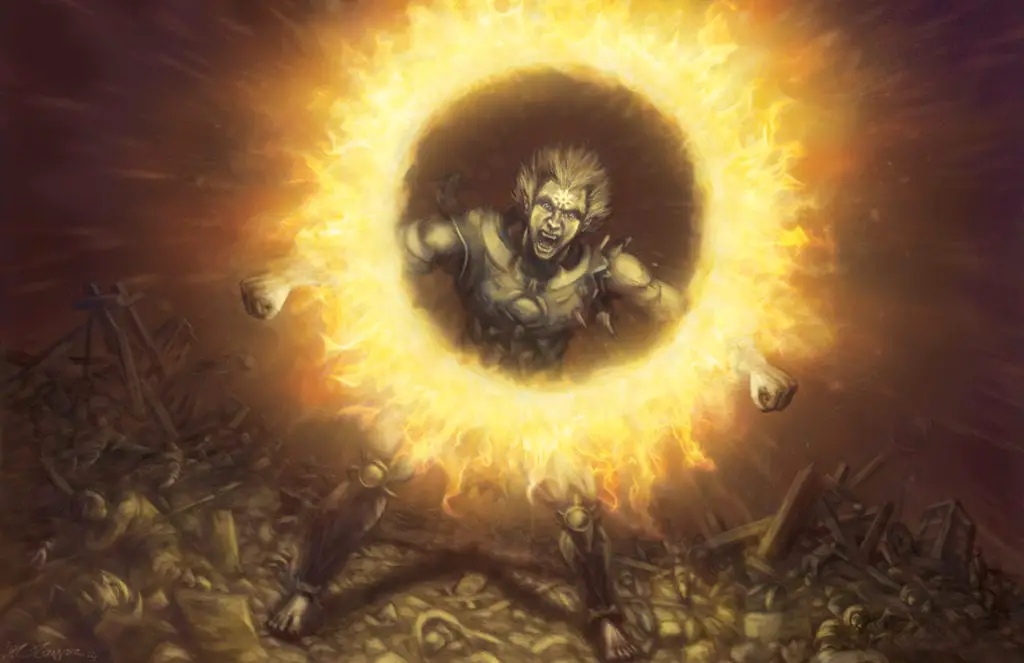
Together, the united Exalted Host brought low the titans and wrested Creation from their grasp. Some of them died, while others were made to kneel. The Exalted had them swear oaths of surrender and locked them away in the body of their king, Malfeas, outside Creation, in what would become hell.
Unfortunately, killing a Primordial isn’t the end of it. Those of them who died were too massive in scope and nature to really die. Their passing broke the cycle of reincarnation, creating the Underworld, Creation’s dark mirror. They now forever exist there, mad with pain and longing for oblivion. With their dying breaths, they condemned their killers, inflicting the Great Curse.
The Exalted Host proceeded to lead humanity into a golden age, but it couldn’t last. The excesses of power and the Great Curse gnawed on the minds of the Solar heroes and rulers, driving them to madness and cruelty. So much so that the Unconquered Sun turned his face from the world in disgust.
Eventually, the Sidereals made two prophecies to see what to do about it. The Prophecy of Gold stated that it’s possible to turn the Solars from their destructive path…but there’s no guarantee it would succeed. The Prophecy of Bronze stated that if the Solars are cast down, the world will be diminished but survive.
Those Sidereals who preferred grim certainty over uncertain hope conspired with the Dragon-Blooded to overthrow the Solars, which began in a single massacre people would later call the Usurpation. Most Solars died, as did many of their Lunar consorts and stewards. The Dragon-Blooded remained as the rulers of the world, with Sidereals retreating into Heaven.
Thus ended the Fist Age of humanity. The new rulers of the world created a civilization of the Shogunate, where many noble houses fought for power. But it wouldn’t last, as the Great Contagion, a plague deadly like no other, decimated Creation. In its wake came an invasion of monsters from beyond the world. Creation seemed to stand on the brink, until an officer found and activated the Realm Defence Grid, a geomantic super-weapon that remained from the First Age.
The weapon decimated the invading Fair Folk, and its new wielder called herself the Scarlet Empress, the world’s new overlord. She bent the remnants of the Shogunate to her will and created the Scarlet Empire. She deliberately orchestrated it to be entirely dependent on her and her alone, creating Great Houses from her own children.
And then, she disappeared. No one knows how, why or where, but her empire is crumbling in her absence. The Sun has chosen to turn his face back towards Creation and the Solars are returning. The Age of Sorrows is reaching its tipping point, that will lift it up again or plunge it into the abyss.
That’s for a brief and cursory summary of the history. But you’re probably wondering who all those Exalted are, and what they do, and what stories we can tell with them. Let me begin from the two kinds we can currently play.
The many who are Chosen
Solar Exalted, or the Lawgivers, are the game’s default protagonists, who appear in the core rulebook. They’re the chosen of the Unconquered Sun, returning god-kings who will save or doom Creation with their deeds. The Great Curse still hangs over them, and the power they wield can corrupt even without it. But maybe they will be able to redeem themselves and prove that the Sun was right to turn his face back on Creation.
The Solars’ themes are excellence and heroism of mythical proportions. They’re the mightiest of Exalted and the rules drive it home. Their abilities manifest themselves through supreme mastery of different skills. A Solar master of combat can rout armies and slay behemoths. A Solar artificer can produce wonders unseen since the end of the First Age. And a Solar orator will inflame passions, sway hearts and minds and empower prophets. Their Exaltation often comes at a moment of glory and victory, but not always. There are many ways in which they can catch the Sun’s gaze and make him think, “there is someone that I want to spread my word in this fallen world.”
Somewhat balancing it is the fact that Solars aren’t established yet, the way other Exalted types are. And the more waves they make, the more likely they are to provoke response from the Realm, even fraught as it is with the impending civil war.
There are things Solars cannot do, though, which mostly fall outside their motifs of supreme human ability and the Sun’s glory. They can’t command the elements, change shape, take flight, or see the future. However, they can make up for some of it with magic artifacts, martial arts, or sorcery. Such sources of power are available to anyone (even some rare mortals), but Solars’ mastery over them is second to none.
Playing a Solar means being a massive fish in a small pond. Their power is immense and they find it very easy to excel in what they focus on or dabble in many skills. Thus, challenges to Solars are often like those we see in superhero stories. It’s not about giving a Solar weapon-master a monster too big, bad, and scary to cut down with their blade, but about giving them challenges they can’t outfight. A Solar king might shine with Sun’s glory with their every word, but there are no Charms for being a just, fair, and wise ruler.
The Solars’ past hangs over them as new ones appear in Creation. They ruled the world once and brought it to the brink of ruin. Can they avoid repeating it? Do they even want to? The Sun can’t and won’t tell them what to do; that goes against the idea of Exaltation. All he does is choose them and let them go to make the world more righteous as they see fit.
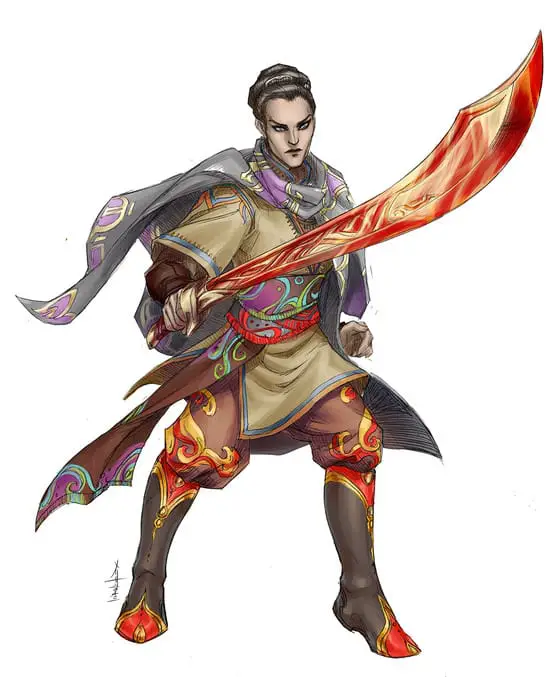
The Dragon-Blooded, also known as the Terrestrial Exalted, Princes of the Earth and the Ten-Thousand Dragons are the weakest among them, but reading through their book quickly shows how relative that comparison is. The Dragon-Blooded are still Exalted, still heroes, and Creation quakes in their passage.
The power of the Terrestrials comes from their lineage. The blood of the Dragons is strongest in the Scarlet Dynasty of the Realm, but there are others out there—the nation-state of Lookshy, the cabal of Forest Witches, or many smaller families scattered across the world. Sometimes, the blood manifests in a lone outcaste.
Despite what their name might suggest, they don’t have any draconic elements. Their power expresses itself in form of superior skill, but also elemental themes: fire, air, water, earth, and wood. The last is there as a nod to Chinese traditions, perhaps, but also due to old White Wolf’s deep and abiding love for the number five. Dragon-Blooded are elemental demigods who field the raw force of nature.
Many readers will no doubt think of Avatar: the Last Airbender and Legend of Korra now. Dragon-Blooded predate both of those shows, but their current incarnation in the third edition isn’t shy about drawing inspiration from them. Of course, Dragon-Blooded are far more powerful than benders and directly manipulating the elements is just one of many things they can do.
One of the main settings to play Dragon-Blooded in is the Scarlet Dynasty, the ruling class of the world-strangling empire. The elemental demigods who still keep their boot on much of creation engage in the same politics and dynamics all empires do, but the great power and burning passion of the Exalted drive them to extremes. With the Scarlet Empress gone, the Great Houses vie for power, the satrapies are rebelling, and nothing is certain. The Solars are returning and the Lunar Anathema are ever howling at the gates. And the need to keep the bloodlines strong is as strong as ever.
Another aspect of the Terrestrials is the Immaculate Faith. It’s a religion created by Sidereal Exalted to solidify a Dragon-Blooded mandate over Creation. It posits that the Dragon-Blooded are spiritually superior beings, close to the Five Immaculate Dragons, who represent the pinnacle of all life.
It also declares the Solars and Lulars “Anathema”—demons who stole power from the sun and moon and now possess strong but unvirtuous mortals. The Immaculate Faith is the state religion of the Realm, but it’s present in many other places beyond it. Once, the heirs of the Realm rode out in great Wyld Hunts to slay them. Nowadays the resources they can spare to hunting them down grow scarce.
Playing a Dragon-Blooded means having power over the elements and walking among the people of creation as a hero. You may come from an illustrious lineage or from the teeming masses. Your power is great, but still lesser than that of other Exalts, so the stories it allows are different. If you choose to play a Dragon-Blooded who’s part of the Scarlet Dynasty, you will step into a world of intrigue, politics and burning passion in an empire whose wealth derives from ceaselessly exploiting people fare and wide.
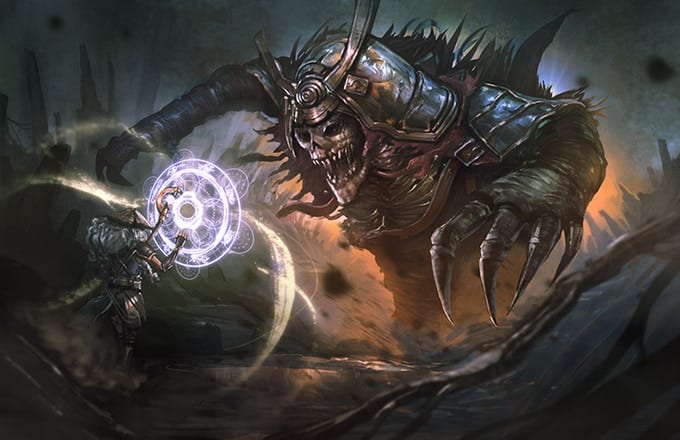
Those are the two kinds of Exalted we can play right now. The next ones we will receive are the Lunar Exalted, Luna’s shapeshifting god-monsters. They were the seconds of Solar Exalted in ages past—consorts, lieutenants, and assassins. But then the Solars died, and Lunars had to flee to the borders of the world from their killers. Since then, many Lunars have fought a ceaseless war against Dragon-Blooded and Sidereals, particularly after the Immaculate Faith branded them Anathema. They’ve found a place for themselves in the world after the Solars’ departure, but the Lawgivers’ return casts doubt on it.
Lunars have had a difficult history in the game that I won’t bore you with. The current developer team has a vision of them as raw, physical, cunning, and powerful heroes embodying change, towering rage, and themes of predation and symbiosis. Lunars walk the wilds of Creation as rightful masters, stride among barbarian tribes as living gods and rally them to battle against the Realm. They have plenty of reasons to hate it, but not all of them choose to take part in the endless war, preferring to seek their own ends. After all, who can tell a skin-changing moon-hero what to do or where to go? Many Lunars nonetheless look over mortal communities as unseen protectors and trickster mentors.
The Sidereal Exalted, the authors of so much of the right mess I’ve described so far, are the shepherds of Fate. They dwell in Heaven, as their actions during the Usurpation have caused them to disappear from Creation’s eyes. They hold sway over fate and destiny, both predicting it and manipulating it. Theirs is also a master of martial arts not even Solars can match. Sidereal Martial Arts twist fate and resonate with abstract concepts rather than simply different forms of combat.
The Abyssal Exalted are a new arrival on the scene, one whose appearance coincided with that of Solars. That’s because they’re Solar dark mirrors. The forces of the Underworld stole Solar Exaltations on behalf of the undying titans at its centre and twisted them to become Death’s lawgivers in hope of bringing about Creation’s end. But they can’t hope to cage and control Exalted, and the Abyssals are free to do as they please.
The Exigents are a different sort of thing. They’re the Exalted of the smaller and greater gods who dwell in Heaven and in Creation but can’t aspire to the lofty heights of the Sun, Luna, or the Maidens. Any god can petition the Unconquered Sun for Exigence, which is a portion of his divine fire through which a god may invest power into a mortal. Of course, there’s also tales of gods obtaining Exigence through theft or other unsavory means…
Exigence takes a great toll on a god. Creating Exalted isn’t something done lightly. But those gods who are willing and able will receive a champion like few others. Exigents have as much variety as the gods of Creation, which is to say a lot. We have no rules for them yet, but they hold promise for creating our very own, unique Exalted.
There are other Chosen who walk Creation and other worlds, but I’ve gone on about them long enough. What’s the world they inhabit like?
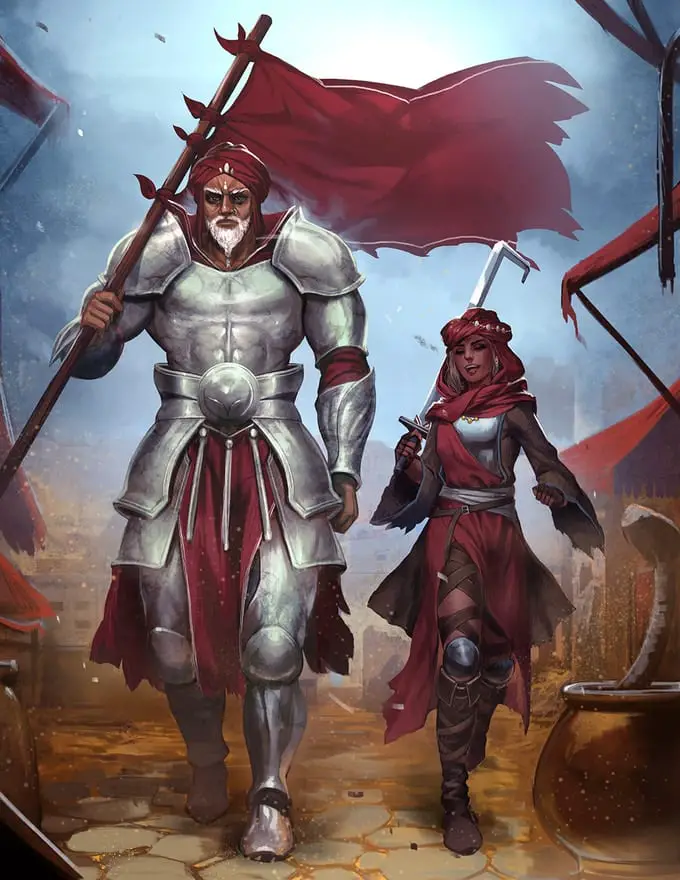
A world of myth and drama
Creation is a flat world amidst churning chaos, and relics of past ages litter its every corner. Mortal cultures of every stripe inhabit it, among gods, Exalts, and stranger beings. The book paints a dizzying variety of mundane and supernatural setting elements, and it’s very refreshing to see a world that incorporates fantastic elements into it from the ground level.
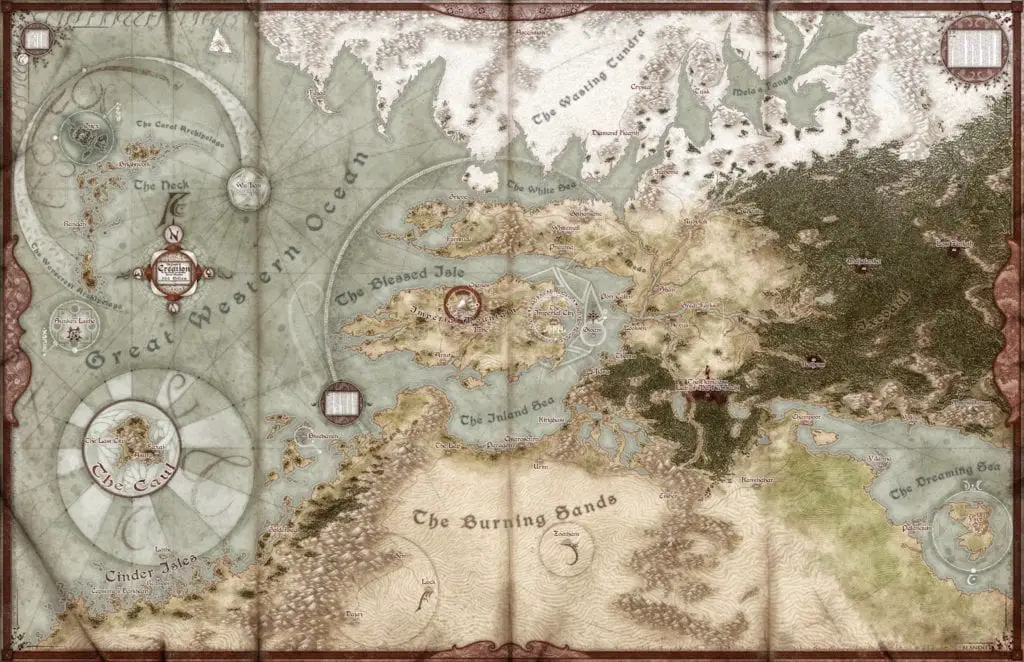
Many settings are afraid to let magic affect things. They paint the usual “European knights and wizards” picture, with magic mostly mattering to the player characters. Not so in Exalted. Solar artificers and sorcerers once created wonders beyond compare, shaping the world to their desires. In their absence, the Dragon-Blooded couldn’t maintain this artifice, which fell into disuse. But now the Solars are back.
Even aside from the works of Exalted, Creation is teeming with magic great and small. Gods, spirits, elemental, demons, sorcerers, and among all of those, humans who seek their own ends, try to change the world or just survive. The world this game paints is very intentionally amoral and might-makes-right. Righteousness is what those powerful enough decide.
I’ve spoken a lot about the Exalted, but gods also warrant mentioning. Creation is full of them, both great and small. The greatest are the Most High: the Sun, Luna, and the Maidens. But the gods run the gamut in power and influence, both in Heaven and on earth. The least of the gods are small deities of rivers, fields, or forests.
But even those least gods have great influence compared to mortal humans. After overthrowing the Primordials, the gods and Exalts created a hierarchy and bureaucracy to bind the gods together. But after the Solars’ disappearance, it has gone into disarray. Now nothing stops gods from extorting, bullying, and abusing mortals. Not unless the mortals have some leverage over them.
Nothing, of course, except Exalted. Many gods are no match for their power, and part of the Immaculate Faith that holds sway in the Realm is assigning every deity its proper place. They will get their share of prayer and devotion, as long as they fulfill their tasks within their spheres of influence. If not, Dragon-Blooded monks of the Immaculate Order wield powerful elemental martial arts, which the Sidereal sifus designed to help them bring unruly spirits to heel.
I’ve gone on about the setting and dramatis personae a lot. What about the mechanics? The rules of the game are hefty and heavy. They’re hard to approach and it helps to start out with mortal characters. Yes, you can play mortals. They lack the sheer might of the Exalted, but they’ve got their own stories to tell and their own impact to make on the world. More importantly, they don’t come with the plethora of superpowers and the rules that adjudicate them.
The Instruments of their glory
What are some mechanical widgets that make Exalted stand out? I’d like to draw your attention to two: combat and social influence.
The designers of the third edition had a problem. How to make combat between demigods enjoyable, and how to make rules that properly reflect such titanic struggles? The previous editions of the game had fallen into the trap of offense overwhelming defense. The Exalted and foes equal to them in strength threw around attacks with such power that they mostly obliterated their targets unless they raised an equally powerful defense.
But that’s not very exciting, is it? From the perspective of the players, if one combatant negates another’s attack, nothing happened. Until someone slips up and becomes a fine red mist. Third edition counters it with initiative. To avoid getting into the nitty-gritty of things, there are two kinds of attack: withering and decisive. Withering attacks steal initiative from enemies and give it to you. Then a decisive attack targets the enemy’s actual health, using your initiative as a damage pool.
This means that you need to build your momentum and position yourself to strike. It also lets powerful attacks go off without actually killing someone. Thus evoking the battles of myth and fiction, where opponents dance and struggle with each other before someone finally lands a decisive blow.
The social influence system addresses another problem. In too many systems, persuasion, diplomacy, and subterfuge boil down to rolling once and figuring it out from there. Or bypass rolling entirely, which is unfair to people who invested mechanical resources into it. With Exalted, another problem is letting the player characters convince anyone to do or think anything just because of how incredibly good they are at the relevant skills.
The game counters it by means of Intimacies. In a general sense, they’re things people believe and hold important to them. Whether they’re relationships to other people, philosophical beliefs, old grudges, ambitions—anything.
You cannot convince anyone of anything or get them to act on your behalf if you don’t attach your attempt to a relevant Intimacy. Likewise, if your attempt runs counter to one, it will be more difficult or outright impossible. But Intimacies can be created and weakened through social influence or simply through events of the game.
For instance, you can’t convince a loyal officer to betray her liege lord, no matter how many dice you throw at the problem. So if you want to do it, you will need to erode her loyalty somehow or appeal to some other Intimacies she holds. For instance, if the officer is a fervent believer in the Immaculate Faith and her liege lord has been consorting with Anathema, you can use that information. And obviously, no one says the consorting with Anathema has to be true.
I hope my rather lengthy introduction has at least sparked an interest in you about Exalted. It really is a special game that deserves some consideration and perusal. And if I’ve managed to do that much, I’ve done a good job.

